|
Background
For many years Britain had
been the dominant economic power in Europe, but
by 1914 Britain was being outperformed by
Germany, which had previously been an important
customer for many of our largest industries. As
Germany’s industries flourished, British exports
suffered, and some industries began to decline.
The Outbreak of War
For some years imperialism
had grown in most of the major European
countries, which meant that at some time, the
outbreak war was almost inevitable. It
officially began on 28th July, 1914 with the
assassination of Archduke Franz Ferdinand of
Austria, heir to the throne of Austria-Hungary,
and his wife, Sophie, Duchess of Hohenberg, who
were shot dead in Sarajevo, by Gavrilo Princip,
one of a group of six Bosnian Serb assassins.
After the assassination, Austria-Hungary
delivered an ultimatum to the Kingdom of Serbia
and prepared to invade.
At the time there were two
groups of allies in Europe:
The Allied Forces - France,
United Kingdom, and Russia.
The Central Powers - Germany and
Austria-Hungary.
Britain had a treaty with
Belgium, and so declared war with Germany when
the German army invaded Belgium and Luxembourg,
on its way to France. Soon all the major
European powers were involved in the war, which
within a few years involved many countries
throughout the world.
When Britain declared war
on Tuesday the 4th August, 1914, celebrations
were held throughout the country. Most people
believed it would be a quick and simple affair
that would be over by Christmas. Patriotism was
high, and large numbers of men rushed to join
the forces to answer the call to arms. The
government wanted 100,000 volunteers and began a
large recruitment campaign which bombarded the
public with posters. This was so successful that
within a month 750,000 people had volunteered. |
|
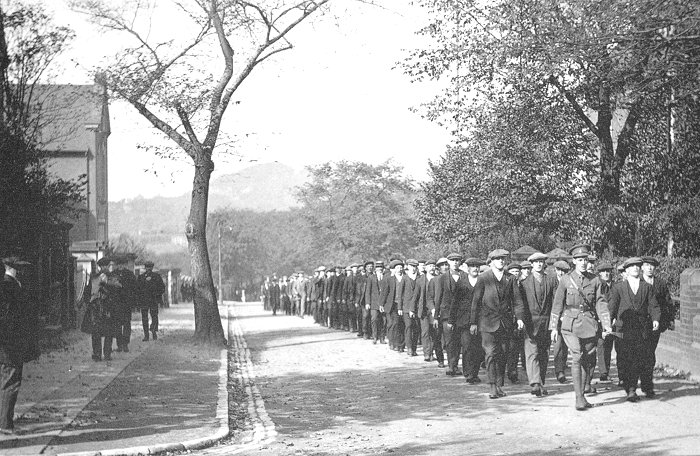
A group of volunteers
marching along Priory Road. |
|
Sadly it was not to be
a quick affair. As the German troops entered
France, the French and British troops moved
northwards to meet them, and the massive
armies dug-in, starting the terrible trench
warfare which would last for four long years.
The Home
Front
The day before the
declaration of war was Bank Holiday Monday,
and people expected an imminent announcement
about the forthcoming conflict, which
started the next day when war was declared.
All the army and navy reservists and members
of the Territorial Army were called-up and
on Wednesday the 5th August, a special
service was held in the Market Place for the
Dudley companies of the 7th Battalion
Worcestershire Regiment, who marched off to
loud cheering from the many onlookers. A
large number of horses were requisitioned
from both Dudley and Netherton and were sent
to the continent.
The Worcestershire
Regiment was part of the British
Expeditionary Force that landed in France on
the 17th August. Their first engagement with
the enemy was at Mons in Belgium, where
there were a vast number of casualties. The
British Expeditionary Force consisted of
about 70,000 regulars and reservists, who
were forced to retreat on the 23rd August.
Because of the heavy losses, Lord Kitchener
appealed for one million new recruits, for
the armed forces.
On the 8th August,
Parliament Passed the Defence of the Realm
Act which gave the government a range of new
powers to prevent anyone assisting or
communicating with the enemy. The press was
censored, to keep-up people’s morale, and
plans were made to ensure that scarce
resources were correctly used. The Admiralty
and the Army Council were given powers to
take-over any factory or workshop for the
production of arms, ammunition, or products
for the war-effort. Within twelve months the
shortage of munitions led to the government
setting-up its own arms factories, and
eventually taking over the vitally important
coal industry. All manufacturers soon turned
their skills towards the war effort,
producing many essential items. |
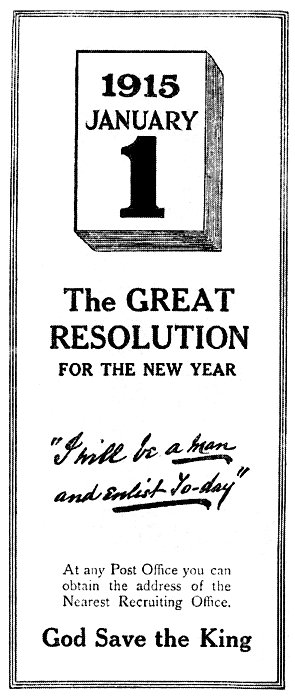
A poster from the
Daily Herald, encouraging men to sign-up. |
Because so many men
joined-up, there was a shortage of labour.
Industry was essential to the winning of the
war. Factories worked flat-out producing
vital war work and armaments for the armed
forces, but initially suffered because of
the shortage of skilled men.
Their roles were
taken-over by women, who for the first time
were allowed to work in some of the more
physically demanding factory jobs, which had
previously been considered to be only
suitable for men. Women also kept many of
the essential services in operation
including the trams, the railways, and our
farms.
The war had a vast
impact on everyday lives. There was panic
buying in the shops and prices rocketed.
There was also a reduction in trade and many
people lost their jobs. In October, Dudley’s
mayoress, Mrs. Lloyd and the local branch of
the Work for Women Fund held a flag day to
raise money to help to find work for
recently unemployed women, but this became
unnecessary because women workers were soon
in great demand.
On the 6th October, 300
men from the new Worcestershire (Reserve)
Battalion left for Kidderminster on their
way to the front. Although there was no
official announcement, flags were flown in
the Market Place and many people gathered to
see their departure and to wish them well.
In the first couple of months of the war,
around 6,000 Belgians, fleeing from the
advancing German army arrived in Britain. At
a meeting in October at the Town Hall, the
local authority decided that Dudley would
accommodate some of them and on the 21st of
the month the first 22 arrived, followed by
others in November. They were initially
accommodated in Wellfield House until a
hostel was established in Castle Street, but
because of friction between the French and
Flemish speaking refugees, a second hostel
for the Flemish speakers opened in Old Cross
Street. They were all well looked after by
the locals, who provided food and raised
money for them. |
|
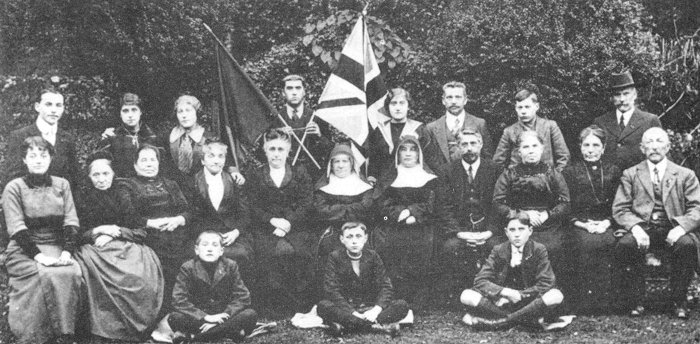
A group of Belgian
refugees at Dibdale House. |
|
Initially large numbers
of men volunteered to join the armed
forces, liking the idea of free foreign
travel, in the certainty that it would all
be over by Christmas. Within a little while,
people realised that this was not the case, and
the number of volunteers plummeted. In
November, a patriotic meeting was held to
encourage volunteers, but it ended with no
new recruits.
Many organisations were
set up to provide comforts for the troops.
Young women and girls helped to provide
clothing. Some became temporary nurses to
help with returning casualties. The Dudley
Patriotic Committee was founded to raise
money for war charities and regular food
parcels were sent to men at the front and
prisoners of war. Pupils at Dudley Girls
High School spent a lot of time knitting,
sewing and making parcels for the soldiers.
The futility of the
stand-off between the vast armies meant that
large numbers of people were killed or
wounded, and enormous numbers of men were
needed at the front. In 1915 the Germans
declared an official naval blockade of
Britain, and threatened to sink any ships
sailing into British ports. The Americans
immediately objected because many of their
cargo ships sailed here, and the blockade
was cancelled. Two years later it was
reinstated, which caused the Americans to
enter the war.
In the autumn of 1915,
Lord Derby headed a campaign which resulted
in around 300,000 new recruits, but it was
still not enough to meet the needs of the
army. In January 1916 the prime minister,
Herbert Asquith, introduced conscription for
all single men aged between eighteen and
forty, which was seen as the only way to get
all of the troops that were needed.
Companies involved in
munitions work included Harper, Sons & Bean
Limited at Waddams Pool Works. George Bean
was Mayor of Dudley in 1908, 1911, and 1912.
His business greatly prospered during the
First World War thanks to a plentiful supply
of ministry contracts for munitions. The
factory buildings were extended in order to
increase the production of shrapnel and
shell cases. By 1916 around 21,000 shell
cases were produced every week. After the
war George received a knighthood for his
services to the war effort, and his only son,
John, known as Jack, who also worked in the
business, was made a CBE. Some of the
company’s land at Waddams Pool was purchased
for the construction of the National
Projectile Factory, which was completed in
May, 1916. Products included a large number
of shells.
The blockade by the
German U-boats led to food shortages, rising
prices, and long queues at the shops. Both
sugar and wheat were in short supply. Due to
the shortage of wheat, the Ministry of
Supply recommended that 20lb. of potatoes
should be added to every 280lb. sack of
flour. The situation worsened and led to the
introduction of food rationing in February
1918. The weekly ration for each person
included 15 oz of meat, 5 oz of bacon, and 4
oz of butter or margarine.
Money
Raising Campaigns
After the Zeppelin
raids on the Black Country in January 1916,
the Dudley Company of the Worcestershire
Volunteer Regiment agreed to observe the sky
and give warning of the approach of enemy
aircraft. They were to give a warning by
rapidly firing three rifle shots into the
air. There were also money raising campaigns
launched to raise money for the war effort,
including the sale of war bonds, ‘Tank
Week’, and ‘Feed the Guns’. |
|
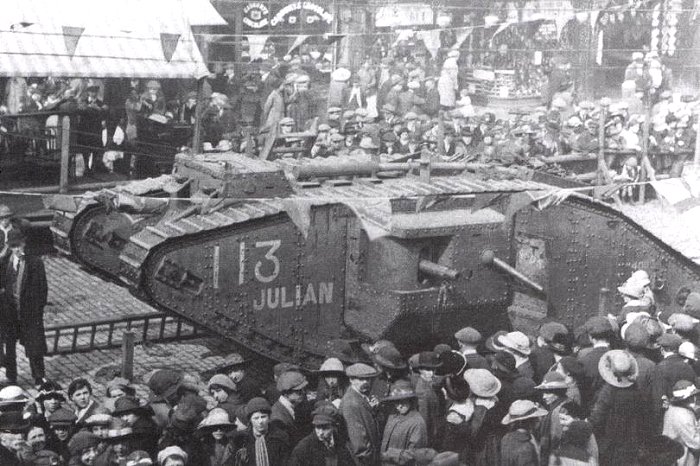
Julian, the touring
tank that raised a lot of money. |
|
Tank week began when a
British tank, which had been given the name
'Julian' arrived at Stourbridge railway
station on the morning of Sunday the 7th
April, 1918. It was touring the country to
raise money and had previously been to
Wolverhampton and Walsall.
Julian was being
transported to Dudley Market Place, but had
a series of mishaps on the way. Outside the
Whymsey Arms, Brierley Hill, the cylinders
overheated. When this had been sorted out,
the tank lost one of its caterpillar tracks,
which had to be repaired at Church Hill. It
finally arrived at the edge of Dudley at
5.50pm., three hours behind schedule.
To assist with the fund
raising campaign, a full-sized model tank
was transported to Brierley Hill on a
railway lorry and placed on council land
beside the Technical Institute and Public
Library, in Moor Street, where it remained
from Monday until Wednesday.
People who purchased
war bonds and certificates had them stamped
“Tank Bank” inside the Technical Institute.
There was also a captured aircraft that was
put on display in Victoria Park, Tipton,
where several aircraft were to take part in
a ‘fly past’ on the Sunday.
On its previous tour of
Scotland, the tank had raised over £40
million, an amazing achievement.
In Dudley Market Place
a large crowd of spectators gathered and the
Mayor asked them to raise more than £1
million. On Monday, several speeches were
given by the Mayor and Deputy Mayor, and the
Member of Parliament, Sir Arthur Boscawen.
Co-organiser Mr. A. M. Fairbairn mounted the
tank and opened proceedings with a series of
speeches. Sir Arthur told the crowd that the
British soldier “never knew when he was
beaten” but needed the support of those at
home. |
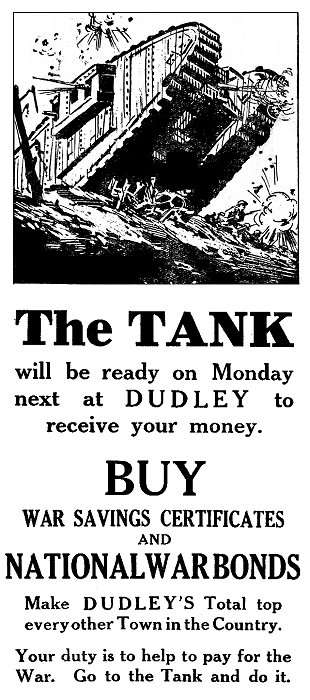
A poster advertising
the arrival of the tank. |
| The first day’s takings amounted to £105,578,
including £20,000 from Grainger and Smith, woollen
merchants, £10,000 from the Pearl Insurance Company
and £1,000 from the National Brassworkers of Dudley.
The takings were collected by the Postmaster, Mr. H.
Sheddon and a team of 20 clerks, in a marquee. On
Tuesday £107,713 was raised, followed by £61,346
on Wednesday. Thursday was Children’s Day
and over 8,000 children walked past the tank,
accompanied by the Dudley Grammar School Band.
During the day, £110,275 was collected. On Friday
the collection amounted to £146,108, including
£32,000 from Alderman Bean. On Saturday, large
crowds gathered both at Brierley Hill and Dudley and
£50,000 was given by the Prudential Assurance
Company. The final amount raised was almost £1.2
million.
On the 2nd November, several guns were placed in
the Market Place by the 1st Worcestershire Voluntary
Regiment as part of the ‘Feed the Guns’ fund raising
campaign. Soldiers gave demonstrations of camouflage
techniques, signalling and gas attacks. The display
raised a staggering £0.5 million. |
|
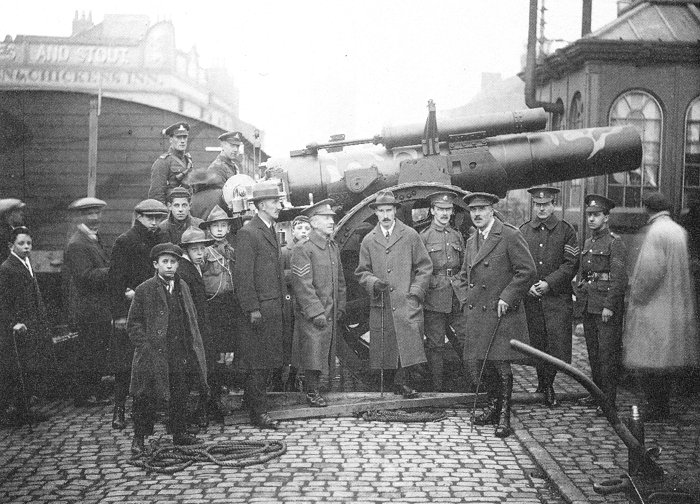
The guns placed in the Market
Place for 'Feed the Guns'. |
|
The End of the War
Less than two weeks later, it was
all over. After a German offensive along the western
front, the Allies and the American forces successfully
drove them back, leading to the armistice on Monday the
11th November and a victory for the Allies. The Market
Place and streets in the town centre became crowded and
bunting appeared throughout the town. In the evening,
several hundred people and four bands marched from
Waddams Pool to the town centre, with banners, flags and
torches. A firework display was held in the castle
grounds and many pubs closed early when they ran out of
beer.
600 soldiers from Dudley lost their
lives in the conflict. Their graves are scattered
throughout northern France and Belgium. The demobbed
soldiers arrived home to be greeted as heroes, but the
town had very little for them in terms of jobs. When the
war ended, orders for war work ceased and so factories
downsized, which led to large numbers of people, out of
work. It was estimated that one in ten British soldiers
lost their life in the conflict and half a million were
seriously wounded.
The war officially ended on the
28th June, 1919, with the signing of the Versailles
Treaty between Germany and the Allied Powers. Germany
had to agree to make territorial concessions, and to pay
£6.6 billion in compensation. This caused a lot or
resentment in Germany which led to the formation of the
Nazi Party and indirectly World War 2.
Saturday the 19th July was Peace
Day. Dudley market closed for the day and people
celebrated in the streets. On the 5th August, a
procession of soldiers, sailors and airmen was
organised, during which over 3,000 returned servicemen
were welcomed home by large crowds of people. |
 |
|
 |
|
 |
Return to
Industry |
|
Return to
the contents |
|
Proceed to the
Inter-War Years |
|